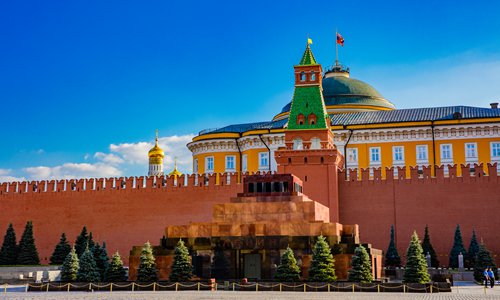HOME >> OPINION
Military ties linchpin of China-Russia relations
By Wang Haiyun Source:Global Times Published: 2019/6/4 19:08:41

Photo: VCG
Military ties play a prominent role in 70 years of Sino-Russian relations. I have been studying Sino-Russian military relations most of my life. As the representative of China's military forces in the USSR and Russia for nearly 10 years, I had participated in the promotion of Sino-Russian defense ties and cooperation. The past 70 years have seen military relations pass through cooperation in the 1950s to confrontation in the 1960s and 70s, and then to deepening cooperation after 1980s.
When the USSR collapsed in December 1991, China recognized Russia as the successor state. Since then, the development of Sino-Russian military relations was reflected in the following fields.
The first is military technology. In 1990, USSR had expressed its intention to carry out cooperation in military technology with China in order to alleviate economic difficulties. Serving as the assistant defense attache in the Chinese embassy in the USSR at the time, I was in charge of the advancement of military technical cooperation. I had access to Soviet authorities in military industries and accompanied the Chinese military industry delegation to several military industrial cities in the Soviet Union.
The large-scale cooperation of military technology between the two countries began around 1993. In order to improve military hardware, China decided to introduce large quantities of Russia's new-generation military technology and equipment. At the time, China suffered military technology blockades from Western powers led by the US. Therefore, Russia was probably the only source of advanced weaponry for our military.
The second component of ties is military security in border areas. On the basis of progress in talks on the border issue, China and Russia immediately began talks on mutual reduction of military forces in the border areas, which I was fortunate enough to participate in. Early negotiations led to an agreement on deepening military trust in border regions signed by China, Russia, Kazakhstan, Kyrgyzstan, and Tajikistan in Shanghai. In 1997, heads of "the Shanghai Five" held their second meeting in Moscow and signed the Agreement on Mutual Reduction of Military Forces in the Border Areas. Since then, China's long-standing common borders with Russia and Central Asia have gone from being a source of military confrontation into that of good-neighborly relations. The "Shanghai Five" was a cornerstone for the establishment of the Shanghai Cooperation Organization (SCO) in 2001.
The third is military education. In the late 1990s, the Chinese and Russian armed forces reached an agreement to strengthen cooperation in military education. Chinese army began to send trainees to dozens of military academies in Russia. Through such training, outstanding army officers have played an important role in Chinese army's modernization.
The fourth is joint military exercises. Sino-Russian joint military exercises began in 2005. Since then, joint military exercises have become normal. Drills have expanded from land, air and sea to new and sensitive fields such as information, anti-missile tech, from operational and tactical levels to strategic levels. The exercises have been playing a significant role not only in mutual understanding, but also in the enhancement of combat capability and strategic deterrence.
The fifth is military theory research. I always say that the modernization of our army, military reform, and the creation of military theories under high-tech conditions should learn more from the Russian instead of the US army. This is because of the following factors:
The first is material basis. Our army's modern weaponry, including independent development of equipment, is basically the same as Russia's. Weaponry largely determines campaign tactics.
The second is geopolitics. China and Russia basically belong to continental countries, and the two countries' armed forces basically belong to continental armies which geographically rely on land. This differs a lot from armies in the oceanic and expansionist countries.
The third is the nature of battle. Both Chinese and Russian armies adopt strategic defensive positions. This is different from the US army's overseas attack and long-range strikes.
The fourth is the bedrock of military doctrine. China's military theory has borrowed extensively from the Soviet as well as Russian armies. In addition, the strategic ways of thinking of the two armies, such as avoiding fighting a war at two fronts, active defense, and focusing on the initiative of officers, are also closely related.
Fifth is international military security. For example, China and Russia cooperated in safeguarding the international nuclear non-proliferation regime, opposing use of force, promoting denuclearization on the Korean Peninsula, countering terrorism, maintaining cybersecurity, opposing the militarization of space, encouraging ending Cold War mind-set among countries all over the world, and promoting a new concept of security. Cooperation over military security sphere as part of the SCO, especially over fighting the "three evil forces," is also inseparable from continuous deepening of Sino-Russian military relations.
Given the significant role of military ties in China-Russia relations, in the wake of close bilateral military relations, it's suggested the two countries develop the two armies into "special friendly forces."
The author is executive director of the High-level Think Tank on China-Russia Strategic Coordination. opinion@globaltimes.com.cn
Posted in: VIEWPOINT